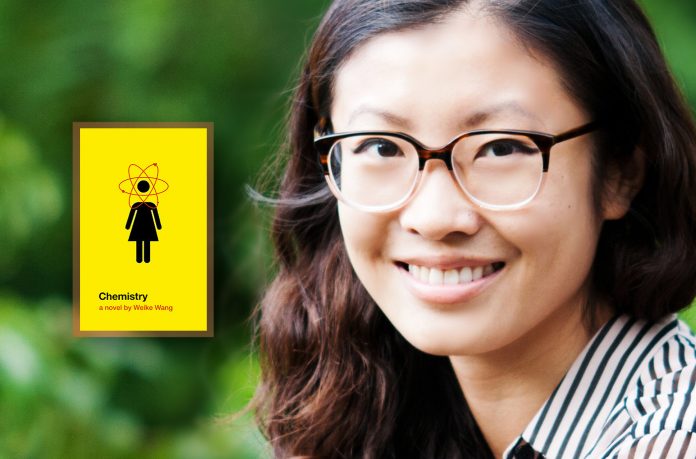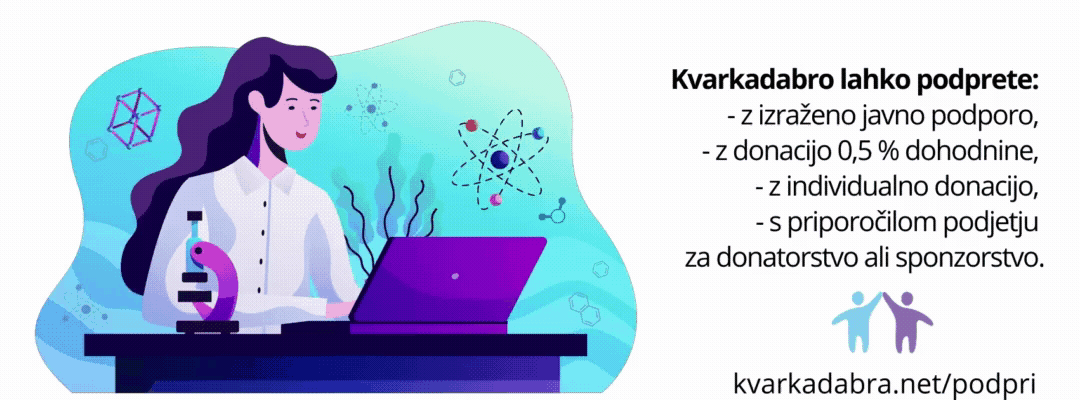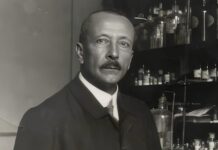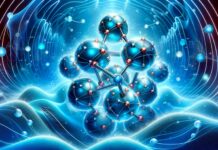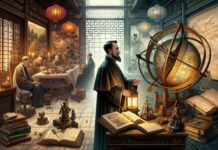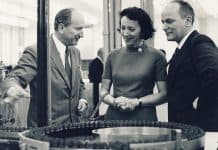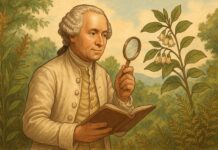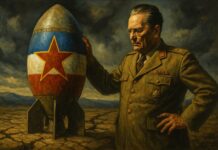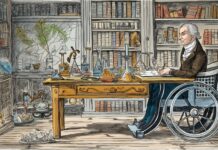Letošnji maj je postregel z zanimivo knjigo, ki so jo revije Entertainment Weekly, The Millions in Bustle označile za »najtežje pričakovani roman leta 2017«. Chemistry: A Novel je prvenec 28-letne Weike Wang, ki je diplomirala iz kemije ter doktorirala iz javnega zdravja na Univerzi Harvard, na Univerzi v Bostonu pa še magistrirala iz finih umetnosti. Wangova v romanu avtobiografske elemente in laboratorijske zgodbe iz časa dodiplomskega študija preplete v do univerzalnosti abstrahirano ilustracijo sodobne znanosti, ki je za premnoge doktorske študente nevzdržna. Grenko vsebino poudarijo ciničen humor, odsekan, laboratorijskim zapiskom podoben slog, ter navidezno brez reda posute znanstvene zanimivosti, ki se protagonistki med pripovedovanjem porajajo v obliki prostih asociacij.
»The boy asks the girl a question. It is a question of marriage. Ask me again tomorrow, she says, and he says, That’s not how this works.
Diamond is no longer the hardest mineral known to man. New Scientist reports that lonsdaleite is. Lonsdaleite is 58 percent harder than diamond and forms only when meteorites smash themselves into Earth.«
Protagonistka je neimenovana doktorska študentka kitajskega rodu, ki v iskanju boljšega življenja v zgodnjem otroštvu z družino emigrira iz Šanghaja v Ameriko. Na eni od prestižnih bostonskih univerz študira kemijo, ki v očeh staršev poleg inženirstva in fizike edina kaj šteje, ter se zgodaj navduši nad organsko sintezo. Na podiplomskem študiju spozna energičnega in optimističnega Erica, čudežnega dečka iz ljubeče družine. Eric, uspešen in stanoviten, pravočasno doktorira, dobi ponudbo za zaposlitev v Ohiu in dekle zaprosi za roko. Toda pod pritiskom okolja, kjer štejejo le rezultati, kjer lahko doktorski študij traja več kot desetletje in kjer samomori študentov ali umori mentorjev niso nič nenavadnega, je Ericovo dejanje kaplja čez rob.
»The PhD advisor visits my desk, sits down, brings his hands together, and asks, Where do you see your project going in five years?
Five years? I say in disbelief. I would hope to be graduated by then and in the real world with a job.
I see, he says. Perhaps then it is time to start a new project, one that is more within your capabilities.
He leaves me to it.
The desire to throw something at his head never goes away. Depending on what he says, it is either the computer or the desk.
I sketch out possible projects. Alchemy, for one. If I could achieve that today, I could graduate tomorrow.«
Po še enem neuspešnem eksperimentu se protagonistka zlomi, razbije laboratorijsko steklovino in se izkriči na sodelavce. Univerza jo najprej pošlje na enomesečni dopust, ki se raztegne v dolgotrajno bolniško odsotnost in psihiatrično obravnavo. Skozi pogovore s psihiatrinjo se odstirajo disfunkcionalni vzorci v študentkini primarni družini. Starša se nenehno prepirata, saj drug drugemu zamerita žrtve, ki sta jih morala sprejeti ob selitvi. Oče, iz revne kmečke družine, se s trdim delom prebije skozi izobraževanje in v Ameriki postane uspešen inženir. Kot se izrazi protagonistka, bi morala zapustiti Ameriko in se naseliti na Luni, če bi želela preseči napredek, ki mu je uspel v eni generaciji. Mati, na Kitajskem cenjena farmacevtka, v Ameriki nazaduje, slabo se priuči novega jezika in nikoli ne opusti misli na vrnitev. Do hčerke sta hladna in avtoritarna, pričakujeta vsesplošno odličnost in ne skoparita s kritiko. Sčasoma izvemo, da se študentka izmika Ericovim željam po poroki in otrocih prav zato, ker se boji, da bo ponovila njuno zgodbo.
»Wire your dollhouse and then you will understand electricity. Wire this bathroom light and then you will really understand electricity. Put the galvanometer here and here and don’t shock yourself. See what happens when you don’t listen to me? You’ve shocked yourself. Now stand up and try it again.
Again.
Again.
Again.
Listen for the Doppler effect or you will never understand sound, and if you never understand sound, then you will never understand melody or harmony or the reason a violin is shaped the way that it is.
If possible, come here and let me show you how real projectiles fly. Here is a stone that you must skip eleven times, no more, no less; you have to get your launch angle just right.
I threw the stone down. It skipped zero times. And he said, You are definitely no child of mine.«
Med zdravljenjem protagonistka sprejme honorarno delo inštruktorice naravoslovnih predmetov, hkrati pa začne tesnobo tešiti z alkoholom. Odloči se, da bo opustila doktorski študij, a starši za to nočejo niti slišati. Njihova nepopustljivost jo požene v anksioznost in nespečnost, zato se jim zlaže, da si je premislila. Ker se jim ni zmožna postaviti po robu, se njen odnos z Ericom začne krhati; ob koncu prvega dela romana se razideta. Eric sledi svoji jasno začrtani poti v Ohio, študentka, neodločna in neodločena, ostane v Bostonu. Univerza jo uradno izpiše iz doktorskega programa.
»It’s doable, I say to the shrink, to drive to Oberlin in one furious night.
But that is not love, she says, that is fear of facing your own demons.
I don’t have demons, I say. I have students and a dog, but at night I do close all my closets out of fear of what might be inside. Dark matter, I believe.
I tell the best friend, He left and I let him. He said he would try not to call.
What are you going to do? she asks.
Not dwell. Move forward.
What are you really going to do?
Stare at spoons.
I tell the math student, Me and the dog make two, and two points define a line.
Remember what Doctor Who said about lines. Not at all interesting.
You need three or more points to define a shape. The triangle is the strongest of all the shapes. When you think geometry, think triangles. The theorem that everyone knows by name, Pythagoras, is a theorem about a triangle.«
Drugi del romana je kolaž študentkinih spominov in samorefleksije. V tem delu najbolj prideta do izraza oba pomena naslova: prva asociacija ob besedi »kemija« je seveda ljubezen, medtem ko se njen prosti prevod v kitajščino glasi »študij sprememb«. Protagonistka razčiščuje svoj odnos s starši, kitajsko identiteto in Ericom. Vsak od njiju v vsak svojem delu Amerike začne novo partnersko zvezo. A nepričakovano voščilo za rojstni dan protagonistko spodbudi, da preseže dotedanje izogibanje stikom in Erica povabi na prijateljski obisk. V skladu s slogom zgodbe je tudi zaključek nedoločen, roman pa nas pusti z več vprašanji kot odgovori.
»I know the tutoring is not permanent. I know I cannot do it long-term. But I like it and am not bad at it.
Maybe I can be a full-time teacher somewhere.
At a school.
Or a small college.
When I can ensure them some sort of stability, I will tell them everything, the quitting of the PhD, my next steps. I need more time to figure this out, and once I do, I will tell them everything.
Half of me says, By not telling the truth, you only hurt yourself. And the other half says, But by telling the truth now, without a plan of how to proceed, you will hurt them more. What would telling them accomplish? It will only cause strife.
Peace of mind? Encouragement? Support?
Don’t say catharsis.
Catharsis.
I don’t want to get married until I have done more for myself. But also I owe it to them to do more for myself, which is what Eric didn’t understand; he said, You shouldn’t owe them anything. We argue over this. The American brings up the individual. The Chinese brings up xiao shun. When I ask Eric if he thinks a child can ever feel entirely independent of her parents, he says, What kind of question is that?
But now I don’t really know. There is too much already shared.
Mother, Father, I think I know what it means to hurt for you.«
Chemistry ne bo pustil hladnega nikogar, ki se osebno ali administrativno ukvarja z znanstvenimi temami; vsekakor ga toplo priporočam v branje vsem sledilcem Kvarkadabre. Če zanemarimo specifično dimenzijo kitajsko-ameriške identitete, ki se ji pisateljica ni mogla izogniti, ponuja roman dobro izhodišče za razpravo o psihološkem bremenu sodobnega doktorskega študija, pa tudi o vzgibih, ki mlade sploh vodijo do izbire znanstvene kariere. Ta razprava se je v zadnjih letih v tujih medijih že razvila, v Sloveniji pa zaenkrat še ni bila deležna pozornosti; morda je zdaj pravi trenutek, da jo odpremo tudi pri nas.

